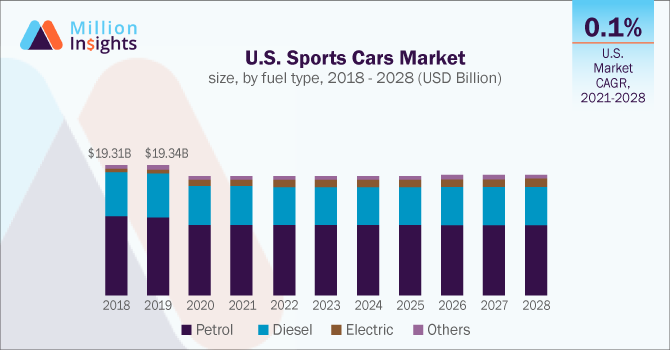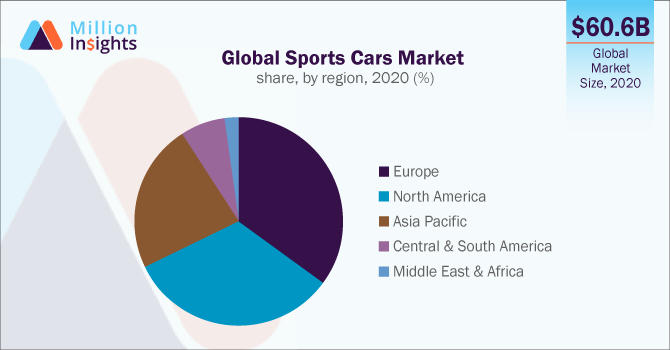The global sports cars market size was valued at USD 60.6 billion in 2020 and is expected to expand at a compound annual growth rate of 1.0% from 2021 to 2028. Global market growth is significantly driven by the rising consumer disposable income levels, most notably in the Asia Pacific and South America regions. With the increasing income, spending on luxurious goods and high-end products, such as sports cars, is also rising. Enhanced performance, aesthetically pleasing sporty exterior, and quality driving are the unique selling points of the sports car. Moreover, strategic business expansion by the key players in untapped regions is also propelling the market growth.

For instance, in June 2019, BMW opened a new production plant in San Luis Potosi, Mexico, strengthening its footprint in an emerging market. Furthermore, as published on September 3, 2021, BMW launched a new sports car line in Mexico at the San Luis Potosi factory with an investment of USD 125 million. One of the major restraints of the global market is the high import duties, which increases the overall cost of the car. For instance, Saudi Arabia, in 2020, increased customs duties on products including passenger vehicles from 5% to 15%. Also, high import tariffs by the Indian government on sports cars and other passenger cars hamper the market growth.
In addition, the rising popularity of SUVs is further restraining the market growth. The outbreak of the COVID-19 pandemic affected the supply chain and trade activities of the global market. Plunged manufacturing and shortage of the auto components declined the factory outputs during the lockdown. The shadow of the pandemic is expected to linger longer and affect the coming years’ market scenarios. However, with the resumed production lines and trade activities, slow growth and market recovery are anticipated.
On the basis of fuel types, the global market has been divided into petrol, diesel, electric, and others. The petrol fuel type segment accounted for the maximum share of more than 58% of the global revenue in 2020. Petrol-based sports cars are widely & easily available and are better performing compared to their counterparts. In the current market scenario, most of the key companies are offering sports cars that use petrol as fuel. In addition, the aftersales services and replacement parts of petrol-based cars are easily available and accessible compared to the other fuel-based cars. These factors are attributed to driving the growth of the segment.
The electric fuel type segment is projected to witness the fastest growth rate over the forecast period. Rising environmental issues and depleting petroleum-based fuel resources are forcing the development of solutions using alternative resources. Electric Vehicles (EVs) running on clean energy and zero-emission are likely to have a strong demand during the forecast period. Many key players in the market have entered the EV space and are planning to produce only electric-based cars in the future, which is driving the segment growth. For instance, on 27 April 2021, British sports carmaker, Lotus, announced its plans to go all-electric by 2028.
On the basis of geographies, the market has been further segmented into Europe, North America, Asia Pacific, Central & South America, and Middle East & Africa. Europe accounted for the dominant share of more than 35% of the global revenue in 2020. The high share is credited to the strong presence of several sports car manufacturers and their extensive distribution networks & service centers in this region. Some of the major manufacturers in Europe are BMW, Volkswagen, and Renault. Higher disposable income levels as well as spending on luxurious products are further estimated to drive the growth of the regional market.

On the other hand, the Central and South America regional market is expected to witness the fastest growth rate of more than 2.5% over the forecast period. The region’s growth can be credited to the increasing sales of sports cars in Brazil and Argentina. Moreover, the growing disposable income levels and expansion of key players in this region are anticipated to drive the market over the forecast period. For instance, as announced on 5th November 2021, Volkswagen plans to invest Euro 1 billion in South America by 2026.
The market is significantly concentrated due to the presence of global players. These companies are actively focusing on the development and launch of improved products to stay ahead in the market. Furthermore, companies are keen on expanding in the untapped markets to grow their consumer base. For instance, Porsche’s Taycan made its launch in Asia Pacific in August 2020 at Marina Bay and in Middle East & Africa in October 2020 at the Burj Khalifa light show. Also, on 20th April 2021, Lamborghini showcased The Huracan STO, super sports car, and a few other models, in China at Shanghai Auto Show. Some of the key players operating in the global sports car market include:
|
Report Attribute |
Details |
|
Market size value in 2021 |
USD 61.0 billion |
|
Revenue forecast in 2028 |
USD 65.6 billion |
|
Growth rate |
CAGR of 1.0% from 2021 to 2028 |
|
Base year for estimation |
2020 |
|
Historical data |
2017 - 2019 |
|
Forecast period |
2021 - 2028 |
|
Quantitative units |
Revenue in USD million/billion and CAGR from 2021 to 2028 |
|
Report coverage |
Revenue forecast, company ranking, competitive landscape, growth factors, and trends |
|
Segments covered |
Fuel type and region |
|
Regional scope |
North America; Europe; Asia Pacific; Central & South America; Middle East & Africa |
|
Country scope |
U.S.; Canada; Germany; U.K.; France; Russia; Italy; China; Japan; India; Brazil; Argentina; South Africa; Saudi Arabia |
|
Key companies profiled |
Stellantis NV; Toyota Motor; Renault; Volkswagen; Hyundai Motor Company; Volvo Car Corporation; Suzuki Motor Corporation; General Motors; Ford Motor Company; BMW Group; Peugeot S.A.; Tesla |
|
Customization scope |
Free report customization (equivalent up to 8 analysts working days) with purchase. Addition or alteration to country, regional & segment scope |
This report forecasts revenue growth at global, regional, and country levels and provides an analysis of the latest industry trends in each of the sub-segments from 2017 to 2028. For the purpose of this study, Million Insights has segmented the global sports car market report on the basis of fuel type and region:
Sign up today.
Call us at +1-408-610-2300 to speak with a
representative.